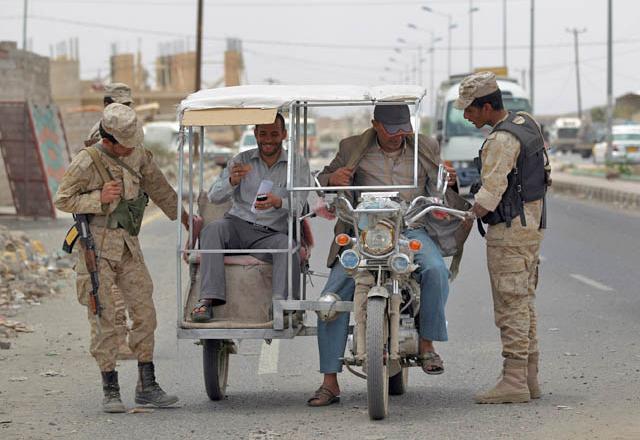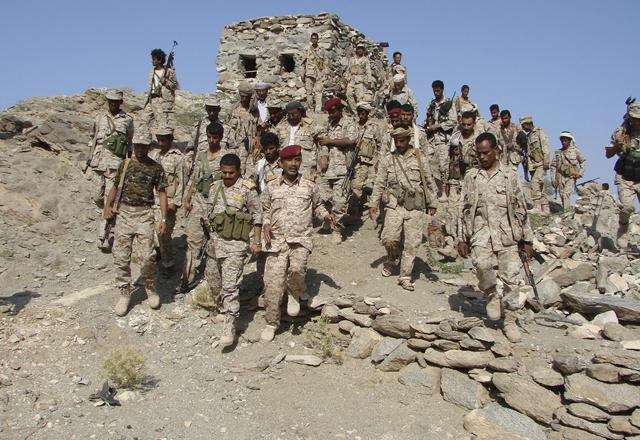You are here
Drone kills six Al Qaeda suspects in Yemen ‘war on terror’
By AFP - May 12,2014 - Last updated at May 12,2014

SANAA — A drone strike killed six Al Qaeda suspects in eastern Yemen on Monday, the first such raid since government troops launched their biggest offensive on jihadists in two years, tribesmen said.
In Sanaa, the US embassy announced the mission would “remain closed for consular services through May 15”, adding that it could remain shut for even longer depending on the situation.
The pilotless aircraft deployed over eastern Yemen targeted a vehicle near Al Husun, a village in Marib province, killing at least six “Al Qaeda members”, tribal sources told AFP.
The United States is the only country operating drones over Yemen, but US officials rarely acknowledge the covert programme.
Two weeks into its government offensive, Defence Minister Mohammed Nasser Ahmed pledged an “open war on terror”, at a security meeting in the southeastern city of Mukalla.
The war aims to “cleanse the regions of Yemen” of terror elements, he said.
Yemen’s army says it has inflicted heavy losses on Al Qaeda in the Arabian Peninsula since it launched a major offensive against AQAP strongholds on April 29.
But suspected AQAP militants have carried out apparent revenge attacks.
Washington regards AQAP as Al Qaeda’s most dangerous franchise and the group has been linked to failed terror plots in the United States.
On Monday, militants opened fire on an army convoy heading from Azzan to Huta, in the southern province of Shabwa, a military official said, prompting an exchange of fire.
Army troops also killed a Saudi militant with Al Qaeda named as Majid Al Mutairi in Shabwa, the defence ministry news website 26sep.net said.
Troops last Thursday announced they had entered Azzan, which had been a jihadist bastion.
The interior ministry, meanwhile, said it has beefed up security in several provinces to prevent likely attacks by jihadists and infiltration by Somali jihadists.
US extends embassy closure
Fears of reprisals as well as a spate of attacks against foreigners prompted the United States to close its embassy in Sanaa last Wednesday.
The State Department “has been apprised of information that, out of an abundance of caution and care for our employees and others who may be visiting the embassy, indicates we should institute these precautionary steps”, said the mission’s website.
Last week, a Frenchman was killed and another wounded when gunmen opened fire on their car in Sanaa’s diplomatic district.
Both worked for a private security firm which officials said was guarding the European Union delegation in Yemen.
Yemeni security forces said the head of a terror cell” behind the attack has been shot dead.
Since Sunday, dozens of Al Qaeda suspects have been rounded up in the capital, a source in the security services told AFP.
The interior ministry said checkpoints were set up around the provinces of Sanaa, Ibb, Baida, Lahij and Marib to prevent the entry of jihadists fleeing the offensive in Shabwa and Abyan.
The ministry added it was on alert to “prevent the infiltration of radical fighters coming from Somalia”, without elaborating.
On Sunday, a suspected Al Qaeda suicide bomber killed 12 soldiers and a civilian in an attack on a military base in the southeastern province of Hadramawt.
AQAP’s leader Nasser Al Wuhayshi recently appeared in a rare video in which he vowed to attack Western “crusaders” wherever they are.
Jihadists use the term crusaders to refer to Western powers, especially those countries which have intervened militarily in Muslim countries, such as Britain, France and the United States.
The ongoing army offensive follows a wave of US drone strikes that killed scores of suspected jihadists in southern and central regions.
Both the White House and Yemeni President Abed Rabbo Mansour Hadi have defended the use of drones despite complaints by human rights groups concerned over civilian casualties.
AQAP took advantage of a 2011 uprising that forced veteran strongman Ali Abdullah Saleh from power to seize large swathes of southern and eastern Yemen.
The army recaptured several major towns in 2012 but has struggled to reassert control in rural areas, despite the backing of militiamen recruited among local tribes.
Related Articles
Yemeni security forces were on high alert Saturday for more Al Qaeda reprisals over an offensive against them, after militants killed five presidential guards and ambushed the defence minister’s convoy.
Yemen’s armed forces have killed 500 Al Qaeda suspects in an assault on their southern strongholds since the end of April, the army said, even as the network killed 14 soldiers on Thursday.
Western embassies in Yemen heightened security measures on Thursday after increasingly bold attacks on foreigners by Al Qaeda, even as the militant Islamists lost ground to an army offensive in the south.

















